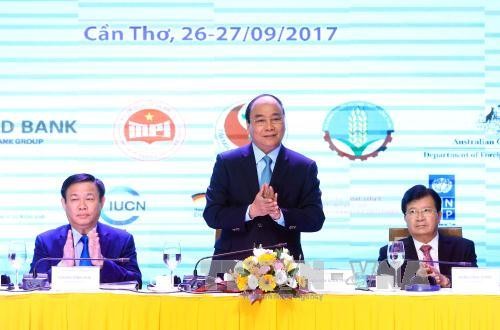(VOVWORLD) -The Prime Minister chaired a conference in Can Tho city today Wednesday on restructuring the Mekong Delta’s resilient development model to adapt to climate change. 500 Vietnamese and foreign participants discussed measures to ensure the region’s resilient development until 2100.
 Prime Minister Nguyen Xuan Phuc chaired the conference Prime Minister Nguyen Xuan Phuc chaired the conference
|
The Mekong Delta has rich potential for economic development with a population of 18 million people. It contributes 18% of Vietnam’s GDP, 90% of its exported rice, 60% of its exported seafood, and 70% of its fruit production. The Mekong Delta has been facing extreme difficulties caused by climate change. The government has mobilized social resources to save the Mekong Delta.
Severe difficulties
When Vietnam declared independence and unification, the Party and state pushed ahead with land cultivation programs to turn millions of hectares of deserted land into fertile farms. The Mekong Delta became Vietnam’s granary to ensure national food security. Now the region is facing unusual challenges from climate change: unpredictable rains, drought, sea level rise, salt intrusion, and land erosion. The Mekong River’s upstream dams have altered the ecosystem and caused severe problems for people’s livelihoods.
In 2012 Vietnam released scenarios on climate change and sea level rise. Some predictions have come true after 5 years of complex changes. Scientists predict that by 2030, if the sea level rises 100 cm, a large part of the Mekong Delta, including Hau Giang, Kien Giang, and Ca Mau province, will be inundated.
Changing the mindset in Mekong Delta development
The conference on restructuring the Mekong Delta’s resilient development model to adapt to climate change has shown the government’s determination to work out a development strategy for the Mekong Delta. Minister of Natural Resources and the Environment Tran Hong Ha said: “The Prime Minister has set goals for the Mekong Delta and other economic regions. The conference must deliver feasible long-term solutions and emergency actions. Each locality and sector will decide their top priorities.”
The conference touched upon infrastructure development, regional collaboration, resilient livelihoods, irrigation systems, natural disaster prevention, land erosion, human resource development, and financial support. The outcomes of the conference will be the foundation for a government resolution on the Mekong Delta. Director of Southern Can Tho University, Professor Doctor Vo Tong Xuan, said: “The conference, chaired by the Prime Minister, should arrive at a general plan. We’ll then make specific arrangements for farmers and the infrastructure.”
The Party and state are working on a long-term development plan for the Mekong Delta to maintain its role as the national granary and adapt to climate change until 2100.